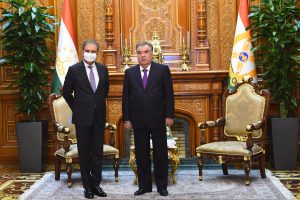Tajikistan isn’t so keen on an exclusively Taliban government in Afghanistan. According to a readout of an August 25 meeting between Tajik President Emomali Rahmon and Pakistani Foreign Minister Makhdoom Shah Mahmood Qureshi, the Tajik side stressed that an inclusive government in Kabul — including ethnic Tajiks — was necessary.
The Tajik readout said that Afghanistan’s ethnic minorities, including Tajiks, make up more than 46 percent of Afghanistan’s population and any government must include their participation. Afghanistan has not completed an official census since 1979. An attempt begun in 2013 reportedly avoided the sensitive question of ethnicity (and it’s not clear that it was ever completed). Tajiks are believed to be the second-largest ethnic group in Afghanistan, at around 25 percent of the population, following the Pashtuns, with whom they have long contested for power in the country.
Following the withdrawal of the Soviet Union’s forces in 1989, the various Afghan mujahideen groups, many of which were ethnically-based, battled each other for power with disastrous consequences. Ethnic Tajiks were at the core of the resistance to both the Soviets and the largely Pashtun Taliban (though the Northern Alliance was multiethnic); the Panjshir Valley’s Ahmad Shah Massoud was a Tajik, as are a number of later Afghan politicians, including Amrullah Saleh and Abdullah Abdullah (who is viewed by many as Tajik although he is Pashtun on his father’s side).
Saleh, who until the flight of President Ashraf Ghani earlier this month was vice president of Afghanistan, has joined with Massoud’s son, Ahmad Massoud, in the Panjshir Valley vowing to resist Taliban rule.
Some Indian media reported recently that the resistance movement in the Panjshir had received “military equipment, weapons, and other supplies from Tajikistan on Monday morning” via helicopter. The Tajik Foreign Ministry denied the reports.
Tajikistan is rapidly becoming a critical country in the wider question of a Taliban-controlled Afghanistan’s neighborhood relations. Dushanbe’s aims are certainly its own security and stability, and its powerful partners — China, Russia, in particular — will hold some sway. At the same time, Dushanbe makes its own decisions and is clearly hedging its bets.
The country is home to Russia’s largest foreign military base, and has been actively exercising with Russian and Uzbek forces in the face of Afghan instability. Dushanbe, the Tajik capital, is set to host summits for both the Collective Security Treaty Organization (CSTO) and the Shanghai Cooperation Organization (SCO) around September 16-17. Russia, which is a member of both organizations, has pushed a fearmongering message suggesting militants are hiding among Afghan refugees to dissuade Central Asian countries from cooperating with U.S. evacuation efforts. Both Moscow and Beijing are pushing for dialogue with the Taliban. The Pakistani foreign minister’s visit this week is part of a regional tour — also to include stops in Iran, Turkmenistan, and Uzbekistan — that he launched Monday with the express intent to bolster support across the region for dialogue with the Taliban as well.
Meanwhile, Tajikistan is reportedly assisting in U.S. and other countries’ evacuation efforts. The degree of assistance is unclear. The readout of Rahmon’s meeting with Qureshi illustrates Dushanbe’s continued commitment at least to the rhetoric of inclusivity in the Afghan government.
“For the nearest solution to all of the political problems and security issues [in Afghanistan], an inclusive government with the participation of all ethnic minorities, especially the Tajiks of Afghanistan, must be reached as quickly as possible” Rahmon said, per RFE/RL’s reporting.
Rahmon emphasized that Tajikistan would not recognize a government “created by humiliation and ignoring the interests of the people of Afghanistan as a whole, including those of ethnic minorities, such as Tajiks, Uzbeks, and others.”
Taliban leaders have met with Afghan leaders, including former President Hamid Karzai and former CEO Abdullah. Their inclusion, even if cosmetic, may satisfy Dushanbe for the time being. It’s nevertheless worth noting that Tajikistan’s president is no stranger to making peace with the opposition, bringing them into government, and then getting rid of them at a more convenient time.

































